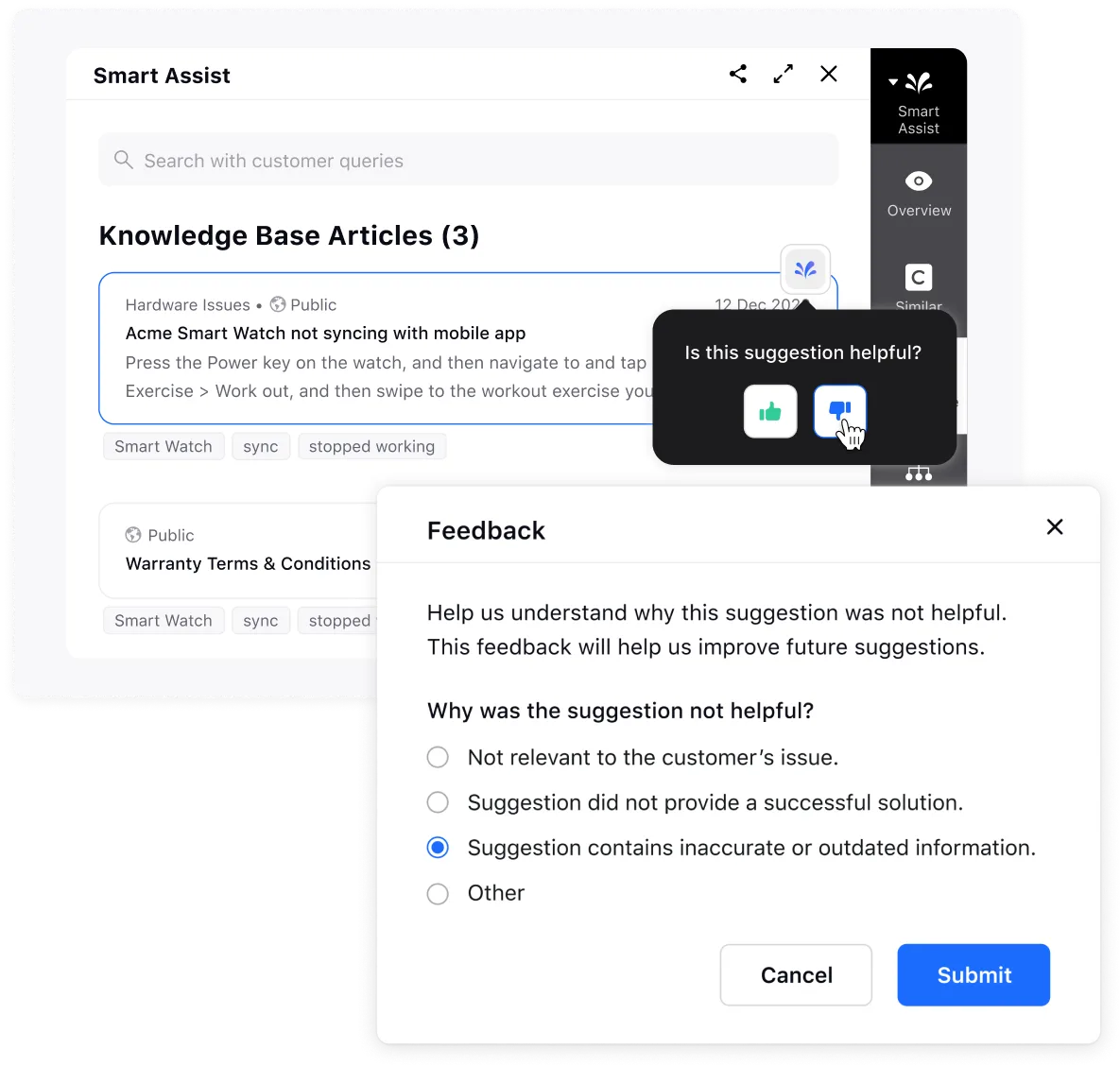An AI knowledge base is a centralized digital repository designed to store, organize and provide access to information using AI. Unlike conventional knowledge bases, an AI knowledge base is dynamic and interactive. It uses machine learning (ML) and natural language processing (NLP), enabling it to learn and evolve from user interactions and data input. This allows the AI knowledge base to improve its accuracy and relevance over time, adapting to the specific needs and patterns of its users. Here’s what you can do with knowledge base AI:
AI continually scans the knowledge base, identifying and updating outdated information to ensure accuracy
It also organizes and tags content, making navigation and retrieval of specific information more efficient
These systems automatically generate answers from company documents, reducing the need for manual searching
Your contact center agents can search the AI knowledge base using simple, non-technical language, thanks to NLP
Learn More: How NLP Helps Improve Customer Service
Why is an artificial intelligence knowledge base important?
An AI knowledge base is vital for customer service as it actively adapts to new information, ensuring agents always have the most up-to-date data. It swiftly processes customer interactions, detecting emerging patterns and updating its content to address current issues effectively.
This continuous learning and adapting boosts AI self-service and lets agents resolve queries faster and with greater accuracy, directly improving your digital customer experience. The AI's ability to constantly evolve keeps the knowledge base relevant and valuable during real-time customer interactions.
🔎 Knowledge Base Management: The Biggest Pain Point for Contact Centers
According to CCW Digitals’ State of Generative AI in Contact Center market study, it was found that:
78% of contact center leaders find it painful and time-consuming to maintain their knowledge bases.
Keeping the KB updated and fresh takes up productive time and adds to after-hours work.
Looking up answers to customer questions is the biggest source of effort and frustration for agents
Sounds relatable? Find more eye-opening insights and actionable solutions in the report. Grab your copy now 👇
Types of AI-powered knowledge base
AI knowledge bases can be built to perform a specific task, or they can include various capabilities to form a self-sustaining AI-backed search engine. Here are a few types to know about.
1. Machine learning-enhanced knowledge base
These knowledge bases utilize machine learning algorithms to evolve from customer interactions. For instance, if customers frequently ask about "battery life" in relation to a specific smartphone model post-update, the system identifies this as a trending concern. It then prioritizes and enriches the knowledge base with detailed information about battery optimization, charging practices, and known issues specific to that model and update. This ensures that agents always have the most current and relevant information at hand.
2. Semantic knowledge base
Semantic knowledge bases excel in understanding the underlying meaning of an input. Such AI knowledge base uses semantic search that applies user intent, context and conceptual meanings to link the typed query to the corresponding information — and fetch it for agents quickly. This is crucial in customer service for accurately interpreting complex or vague customer requests. They can, for instance, differentiate between a customer wanting to return a product versus seeking help to use it, even if the query is ambiguously phrased.
3. Natural language processing (NLP) knowledge base
These systems specialize in interpreting and generating human language. In customer service, they can understand and respond to customer inquiries conversationally via chatbots. NLP knowledge bases can dissect customer queries, irrespective of the language style or syntax used, making them effective for handling a diverse range of customer demographics and query types. Specifically, it does that via these four steps:
Entity recognition: Identifies specific entities (like names, places, products) within an input, crucial for understanding the context of customer queries.
Entity linking: Connects identified entities to relevant information within the knowledge base, enhancing response accuracy.
Natural language understanding (NLU): Interprets the intent and meaning of customer queries, regardless of phrasing or language style.
Natural language generation (NLG): Automatically crafts coherent and contextually appropriate responses to customer queries using natural language.
4. Predictive knowledge base
Predictive knowledge bases help you fix problems before they arise. When the AI identifies a potential issue, it triggers a process where the knowledge base dynamically adjusts its content. This might involve prioritizing existing information related to the anticipated issue or even creating new content.
This information could be disseminated to customer service agents, who can then offer pre-emptive solutions or advice to customers. This is especially useful in identifying and addressing widespread issues before they escalate, leading to more proactive customer service.

Types of content in AI knowledge base
Here’s a quick rundown on the different types and formats of content you get to find in an AI-powered knowledge base:
Structured knowledge content
This content type includes well-organized, easily navigable resources like FAQs, troubleshooting guides, how-to articles, user manuals, and glossaries. It's the foundation of the knowledge base, providing clear, concise answers to common questions. Its systematic categorization makes it simple for AI to retrieve and present the right information efficiently to users or agents.
Unstructured knowledge content
Involving customer emails, social media interactions, support histories and chat logs, this content lacks a predefined structure. Despite its organizational challenge, its richness adds depth and variety to the knowledge base. Advanced AI algorithms play a crucial role here, filtering valuable insights through text analysis and sentiment analysis, giving you a better grasp of your customer psyche.
Automated knowledge content
This content utilizes ML/NLP to generate real-time, personalized responses, like chatbot replies, improving user interaction and filling knowledge gaps dynamically.
3 Benefits of AI knowledge base
Here are three reasons why an AI-powered knowledge base is important for your customer service teams.
1. Efficient first-touch resolutions
AI knowledge base equips chatbots to find relevant information on their own before making it your team’s problem. It powers customer self-service and presents them with relevant solutions from the knowledge base easily.
💡 Growth hack alert
You can integrate Conversational AI Chatbots into your knowledge base to access and learn from your content. These intelligent bots can easily resolve standard customer queries while also clearing your ticket queue.
2. Faster agent response times
In customer service, the old way of searching for information can be tedious for your agents during live service interactions. AI helps your agents search for the exact insights they need from the knowledge base using natural language. This smarter approach cuts down on wait times and frustration, giving the customer service experience a much-needed upgrade.
3. Unified and accessible data
An AI knowledge base updates and unifies information in real time from all teams and interactions, providing agents with a central repository for easy access. It makes it easier for them to pull up relevant data on the knowledge base quickly, regardless of which customer touchpoint it flowed in from. So, when a customer reaches out, whether it's by phone, email or chat, they're guaranteed to get consistent, accurate info with minimal average hold times.
💡 Did you know?
Sprinklr AI+ boosts your knowledge base utilization by helping your agents pull up the exact information from the right articles during live conversations — saving them the pain and confusion of manual triaging.
Key components of AI-driven knowledge base
Here are some AI-specific knowledge base features to look out for.
1. Data repository
The core of an AI knowledge base is its data repository, which stores a vast array of information, including FAQs, product details, customer interaction logs, and support articles. This repository needs to be regularly updated and maintained so your conversational AI and agents can confidently deliver solutions every time.
2. Machine learning algorithms
ML algorithms in an AI knowledge base analyze customer interactions through recurring patterns, phrases, and sentiment trends. They employ techniques like clustering for grouping similar queries and classification to categorize responses. Over time, through reinforcement learning, where algorithms are rewarded for accurate predictions, the system becomes more adept at providing precise, contextually relevant answers.
3. Natural language processing
NLP in an AI knowledge base untangles human language by parsing sentence structure, identifying key terms and understanding context.
Utilizing techniques like tokenization (breaking down text into words or phrases) and semantic analysis (understanding meaning and intent), NLP enables the AI to accurately interpret varied customer queries. It also involves sentiment analysis, gauging the emotional tone of the query, which helps in crafting responses that are factually correct and show customer empathy.
4. Logic mapping
Logic mapping essentially acts like decision trees that guide the AI's problem-solving process. They are constructed using a hierarchical structure of questions and corresponding actions.
Consider a customer-facing issue with an online account.
The logic mapping in the AI knowledge base starts with a general question like “Are you able to log in?”. Depending on the response, the AI follows specific branches: if “No”, it asks, “Is it a password issue?” or “Is there an error message?”. If the user reports a password issue, it further asks “Have you recently changed the password or is this the first time logging in?”.
Doing so will help the AI ascertain if the user forgot a new password or if they are a new user — allowing it a specific password recovery or verification protocol. Each answer guides the AI down a path of increasingly specific queries, gathering essential details to diagnose the issue accurately and provide a targeted solution.
Read more: Essential Features of Free Knowledge Base Software
Example of AI in knowledge bases: Innovation-first customer service
Let’s talk about an electronics company where customer service was a bit complex, with diverse products ranging from the cell phone in your pocket to the fridge in your kitchen. Responding to such a wide range of queries was simply not for the faint of heart.
This was where AI in the knowledge base showed its mettle.
When an agent faced a customer query, AI did more than just fetch data. It interpreted the customer's language, tone, and underlying intent. A single word could have had multiple meanings in different scenarios, but AI knew better.
It sifted through the knowledge base to find articles and curate information that's more than just relevant; it’s precisely tailored to the specific query. AI's ability to parse and interpret large datasets comes in handy, especially during cases where successful resolutions hinge on time.
Such specificity in customer service resolutions is needed, and it's why about 70% of AI suggestions hit the mark for this team. It was AI changing their data into meaningful, context-driven solutions, ensuring that each customer interaction is as effective and relevant as possible.
Check out how this multinational company used AI to power its knowledge bases — in its full glory, right here.
Sprinklr Knowledge Base Software infuses your help center with AI, making it a heartbeat away from every solution your team needs. It essentially turns it into a rapid response hub — letting you anticipate customer queries and deliver spot-on answers.
Less guesswork for agents, more quick wins for customers. Schedule a demo to know more.
Frequently Asked Questions
Thank you for contacting us.
A Sprinklr representative will be in touch with you shortly.
Contact us today, and we'll create a customized proposal that addresses your unique business needs.
Request a Demo
Welcome Back,
No need to fill out any forms — you're all set.


